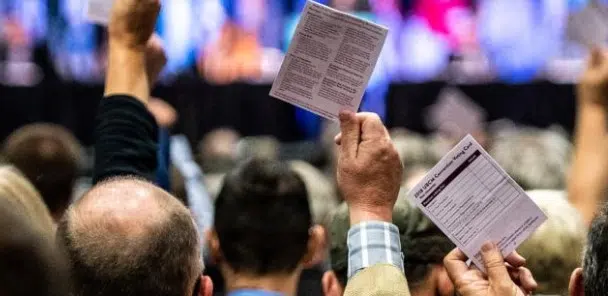
Delegates voting at a UBCM convention/via Union of BC Municipalities
As the Union of BC Municipalities (UBCM) kicks off its annual convention in Vancouver, the group’s president is hoping to see action on a number of issues.
Even though it’s an election year, Trish Mandewo wants to see $650-million in infrastructure money every year from whomever forms the next government. She also wants to see a percentage of the provincial property transfer tax to support housing projects.
“We’re calling on all the parties to really address the challenges that we are facing and to be able look how they can increase funding transfers to communities on a long term basis, not an ad-hoc basis because we really have to plan for our cities and we need to talk about these challenges but we need reform to happen,” Mandewo said.
Local politicians are expected to cover a range of topics including housing, the toxic drug crisis, growing financial pressures, and a host of other issues at this year’s convention, which will wrap up on Friday, the day before the writ is dropped for the Oct. 19 provincial election.
Mandewo, who is on Coquitlam City Council, says the municipalities are looking for a new, flexible revenue stream to help fund an estimated $24 billion in infrastructure replacement that’s expected to be needed in the next 10 years.
She says without the additional money, municipalities won’t be able to build “complete communities” without raising taxes.
“So it’s the individual taxpayers that are going to be paying for that, because local governments have no other way of raising funding,” Mandewo said.
“In terms of the financial gaps as well as staffing capacity, we are also having to deal with homelessness, we’re dealing with the affordability crisis and not to forget the extreme weather events that are intensifying each and every year.”
Mandewo says UBCM also wants to see a share of the growth in the carbon tax to help pay for responding to extreme weather.
“We’re also asking the province to transfer a per cent of gross in the carbon tax – if the carbon tax is still around,” Mandewo said. “We would like for them to transfer a percentage so that we can be able to adapt and to use it for emergency response.”
With an election looming next month, she also wants all parties to have a plan before the official start of campaigning.
“We are hoping they are coming in with a listening ear so that they can build these problems into their planning as they campaign and whomever forms government we want them to go in knowing there are not challenges that they can just ignore but they’re challenges they need to address and put front and centre in their budgeting as they go forward,” Mandewo said.
Municipal leaders are going to spend the week discussing more than 200 pages worth of resolutions at the conference, the details of which you can find here.
Resolutions include calls for more overdose prevention sites, more complex care beds for people struggling with addiction, and more money directed at community safety.
The Thompson-Nicola Regional District will be sponsoring two resolutions at the convention seeking provincial support to rebuild after disasters as well a funding mechanism for small community water systems.
The City of Kamloops is tabling four resolutions while Merritt is sponsoring one connected to the impacts on local government since decriminalization.
“Local governments have been trying to deal with it as much as we can, because we are the ones that are closest to the communities,” Mandewo said. “That issue is not selective, whether you’re a small community or a large community.”
Premier David Eby is scheduled to address the conference this Thursday, while B.C. Conservative Leader John Rustad and Green Leader Sonia Furstenau will speak Friday.
A series of “cabinet town halls” are also scheduled where municipal leaders will get a chance to question cabinet ministers on housing, public service, and emergency preparedness.
– With files from The Canadian Press















